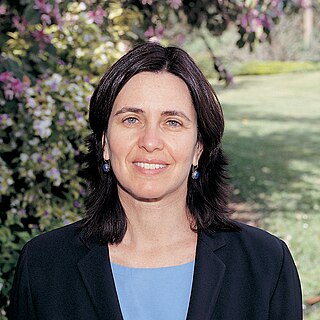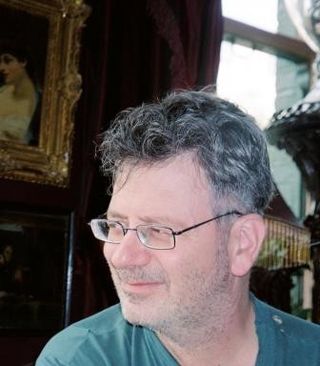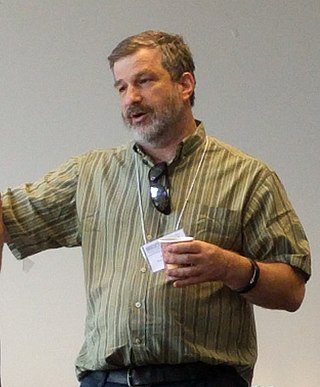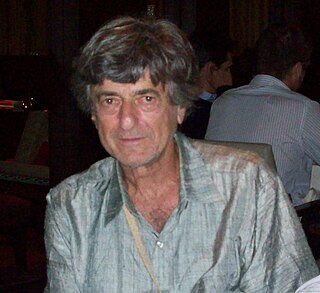
Ronald Linn Rivest is a cryptographer and computer scientist whose work has spanned the fields of algorithms and combinatorics, cryptography, machine learning, and election integrity. He is an Institute Professor at the Massachusetts Institute of Technology (MIT), and a member of MIT's Department of Electrical Engineering and Computer Science and its Computer Science and Artificial Intelligence Laboratory.

In computational complexity theory, an interactive proof system is an abstract machine that models computation as the exchange of messages between two parties: a prover and a verifier. The parties interact by exchanging messages in order to ascertain whether a given string belongs to a language or not. The prover possesses unlimited computational resources but cannot be trusted, while the verifier has bounded computation power but is assumed to be always honest. Messages are sent between the verifier and prover until the verifier has an answer to the problem and has "convinced" itself that it is correct.
Hypercomputation or super-Turing computation is a set of hypothetical models of computation that can provide outputs that are not Turing-computable. For example, a machine that could solve the halting problem would be a hypercomputer; so too would one that could correctly evaluate every statement in Peano arithmetic.

Shafrira Goldwasser is an Israeli-American computer scientist and winner of the Turing Award in 2012. She is the RSA Professor of Electrical Engineering and Computer Science at Massachusetts Institute of Technology; a professor of mathematical sciences at the Weizmann Institute of Science, Israel; the director of the Simons Institute for the Theory of Computing at the University of California, Berkeley; and co-founder and chief scientist of Duality Technologies.

Silvio Micali is an Italian computer scientist, professor at the Massachusetts Institute of Technology and the founder of Algorand, a proof-of-stake blockchain cryptocurrency protocol. Micali's research at the MIT Computer Science and Artificial Intelligence Laboratory centers on cryptography and information security.

Lenore Carol Blum is an American computer scientist and mathematician who has made contributions to the theories of real number computation, cryptography, and pseudorandom number generation. She was a distinguished career professor of computer science at Carnegie Mellon University until 2019 and is currently a professor in residence at the University of California, Berkeley. She is also known for her efforts to increase diversity in mathematics and computer science.

Russell Graham Impagliazzo is a professor of computer science at the University of California, San Diego, specializing in computational complexity theory.
Algorithmic information theory (AIT) is a branch of theoretical computer science that concerns itself with the relationship between computation and information of computably generated objects (as opposed to stochastically generated), such as strings or any other data structure. In other words, it is shown within algorithmic information theory that computational incompressibility "mimics" (except for a constant that only depends on the chosen universal programming language) the relations or inequalities found in information theory. According to Gregory Chaitin, it is "the result of putting Shannon's information theory and Turing's computability theory into a cocktail shaker and shaking vigorously."

Vijay Virkumar Vazirani is an Indian American distinguished professor of computer science in the Donald Bren School of Information and Computer Sciences at the University of California, Irvine.

Oded Goldreich is a professor of computer science at the faculty of mathematics and computer science of the Weizmann Institute of Science, Israel. His research interests lie within the theory of computation and are, specifically, the interplay of randomness and computation, the foundations of cryptography, and computational complexity theory. He won the Knuth Prize in 2017 and was selected in 2021 to receive the Israel Prize in mathematics.
Umesh Virkumar Vazirani is an Indian–American academic who is the Roger A. Strauch Professor of Electrical Engineering and Computer Science at the University of California, Berkeley, and the director of the Berkeley Quantum Computation Center. His research interests lie primarily in quantum computing. He is also a co-author of a textbook on algorithms.

Moni Naor is an Israeli computer scientist, currently a professor at the Weizmann Institute of Science. Naor received his Ph.D. in 1989 at the University of California, Berkeley. His advisor was Manuel Blum.
In computation theory, the Blum–Shub–Smale machine, or BSS machine, is a model of computation introduced by Lenore Blum, Michael Shub and Stephen Smale, intended to describe computations over the real numbers. Essentially, a BSS machine is a Random Access Machine with registers that can store arbitrary real numbers and that can compute rational functions over reals in a single time step. It is closely related to the Real RAM model.
The Blum–Micali algorithm is a cryptographically secure pseudorandom number generator. The algorithm gets its security from the difficulty of computing discrete logarithms.
Toda's theorem is a result in computational complexity theory that was proven by Seinosuke Toda in his paper "PP is as Hard as the Polynomial-Time Hierarchy" and was given the 1998 Gödel Prize.
The Annual ACM Symposium on Theory of Computing (STOC) is an academic conference in the field of theoretical computer science. STOC has been organized annually since 1969, typically in May or June; the conference is sponsored by the Association for Computing Machinery special interest group SIGACT. Acceptance rate of STOC, averaged from 1970 to 2012, is 31%, with the rate of 29% in 2012.

Michael Ira Shub is an American mathematician who has done research into dynamical systems and the complexity of real number algorithms.
Complexity and Real Computation is a book on the computational complexity theory of real computation. It studies algorithms whose inputs and outputs are real numbers, using the Blum–Shub–Smale machine as its model of computation. For instance, this theory is capable of addressing a question posed in 1991 by Roger Penrose in The Emperor's New Mind: "is the Mandelbrot set computable?"










